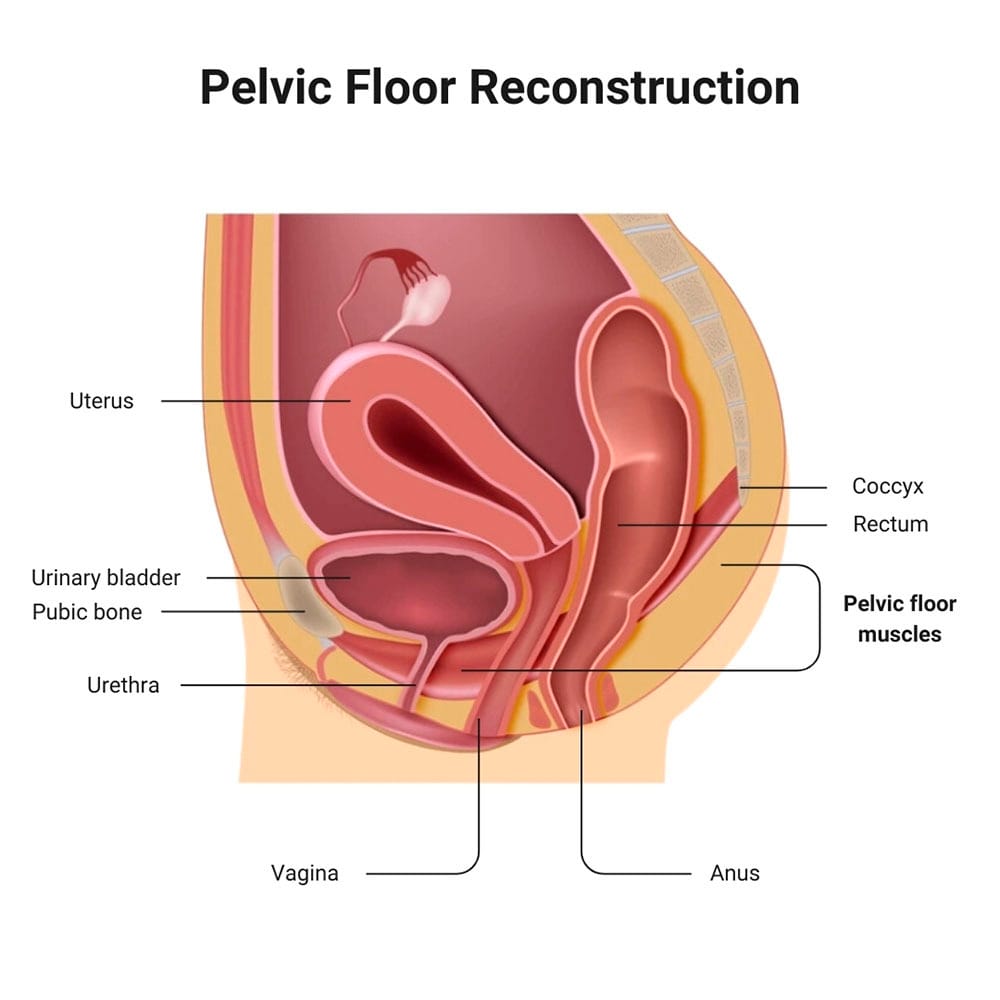What Is Pelvic Floor Reconstruction?
 Pelvic floor reconstruction is the repair and restoration of the muscles, tissues and organs of your pelvic floor, which refers to the muscles that run from your tailbone to your pubic bone. These muscles hold up your bladder, bowels, anus, rectum and urethra, as well as women’s uterus and vagina. Reconstruction alleviates the problems caused by pelvic disorders that have weakened the pelvic floor, including incontinence. The procedure promises a significant change in the quality of life and dignity for those with these feminine problems.
Pelvic floor reconstruction is the repair and restoration of the muscles, tissues and organs of your pelvic floor, which refers to the muscles that run from your tailbone to your pubic bone. These muscles hold up your bladder, bowels, anus, rectum and urethra, as well as women’s uterus and vagina. Reconstruction alleviates the problems caused by pelvic disorders that have weakened the pelvic floor, including incontinence. The procedure promises a significant change in the quality of life and dignity for those with these feminine problems.
Cohen Medical Practice (CMP) in New York City is a talented medical provider for pelvic floor reconstruction and other effective treatments for feminine health and gynecological issues. This team of highly skilled doctors and surgeons provide a personalized treatment plan backed up by their state-of-the-art medical facilities. They have the answer to your needs, be it a routine gynecological checkup or an advanced procedure like pelvic floor repair and hysterectomy.
Am I a Candidate for Pelvic Floor Reconstruction?
It’s common for women to need a pelvic floor reconstruction and not know it. But certain risk factors may make you a candidate for this procedure. Your CMP doctor considers your medical history to see if you fit the profile.
You may need pelvic floor repair after childbirth. Your pelvic floor and muscles could be weakened by recent vaginal childbirth because it exerts extraordinary strain in the pelvic area and organs. And one of the common complaints after childbirth is incontinence due to this weakness. Other factors include:
- Pelvic disorders. Pelvic floor reconstruction may play a role in treating disorders such as fistulae, rectal prolapse and vaginal prolapse.
- Menopause. Low estrogen levels cause the loss of elasticity and thinning of the pelvic floor.
- Genetics. Women whose lineage has had this problem are also likely to experience pelvic floor weakness.
- Previous surgeries. Surgical procedures that touch the pelvic organs can raise the risks of developing pelvic prolapse.
- Multiple pregnancies. Pelvic floor repair after childbirth is a common need since a vaginal birth places enormous strain on the pelvic floor.
What Can I Expect During a Pelvic Floor Reconstruction?
Pelvic floor reconstruction is typically performed as an outpatient service, so you go home the same day. But you might require an overnight stay for observation after an extensive procedure. The duration ranges from two to four hours, depending on the surgical approach and the complexity of the case. For example, the surgeon may perform pelvic floor repair and hysterectomy at the same time to address related issues, requiring an overnight hospital stay.
CMP New York doctors deploy robotic laparoscopic surgery. This minimally invasive method uses a robotic surgical blade with a camera to visualize the pelvic area. This approach offers a significant improvement in precision and dexterity.
The steps in pelvic floor reconstruction include:
- Preparation. This step involves putting you under anesthesia for comfort.
- Incision. Your surgeon makes an incision on the lower abdomen to allow the insertion of the instruments as needed.
- Repair. Necessary repairs are made to restore your organs to the right position; pelvic floor repair stitches keep it in place.
- Closure. The incision is closed after the repair is complete.
What Can I Expect During My Pelvic Floor Reconstruction Recovery?
Pelvic floor reconstruction recovery time takes several weeks depending on your age and overall health profile. Most women return to their normal activities within two to four weeks after the procedure. You should put off more strenuous activities for six to eight weeks.
You must follow the instructions your surgeon provides during your recovery. Dr. Cohen and the CMP team address any complications that may occur.
Some tips for a quick and smooth recovery include:
- Follow-up visits. Attend all scheduled follow-up visits so the doctor can assess how well you’re healing and recovering.
- Ample rest. Avoid activities that involve strenuous bending and lifting for about two months.
- Sexual relations. Avoid sexual activity for at least two weeks.
- Pain management. Take prescribed pain medication as directed for the first few days. Apply ice packs to reduce swelling and discomfort.
- Stress management. Avoid stressful issues and situations. Use relaxation techniques like meditation for a more positive outlook.
What Positive Changes Can I Expect After a Pelvic Floor Reconstruction?
You can expect a significant improvement in quality of life after this operation. Pelvic floor reconstruction is an effective solution for pelvic organ prolapse and related conditions like bladder prolapse.
CMP New York is at the forefront of offering such effective solutions for thousands of women.
Pelvic floor reconstruction provides several positive outcomes that include:
- Eliminating discomfort. This procedure reduces or eliminates symptoms such as constant and persistent pelvic pain.
- Having better urinary control. You regain bladder control and reduce the inconveniences of urinary incontinence.
- Avoiding more complex problems. Pelvic floor reconstruction reduces the risks of complex problems like bowel obstruction, pelvic inflammatory disease and chronic pelvic pain.
- Restoring dignity and peace of mind. This procedure has helped millions of women regain self-confidence, dignity and happiness for being in control of their bodily functions.
CMP New York is your trusted provider for medical solutions for different feminine health problems. This team has the range of skills and expertise to handle both simple and complex issues using advanced medical technologies. Contact Cohen Medical Practice (CMP) today to learn more about pelvic floor reconstruction and how it improves your life.

